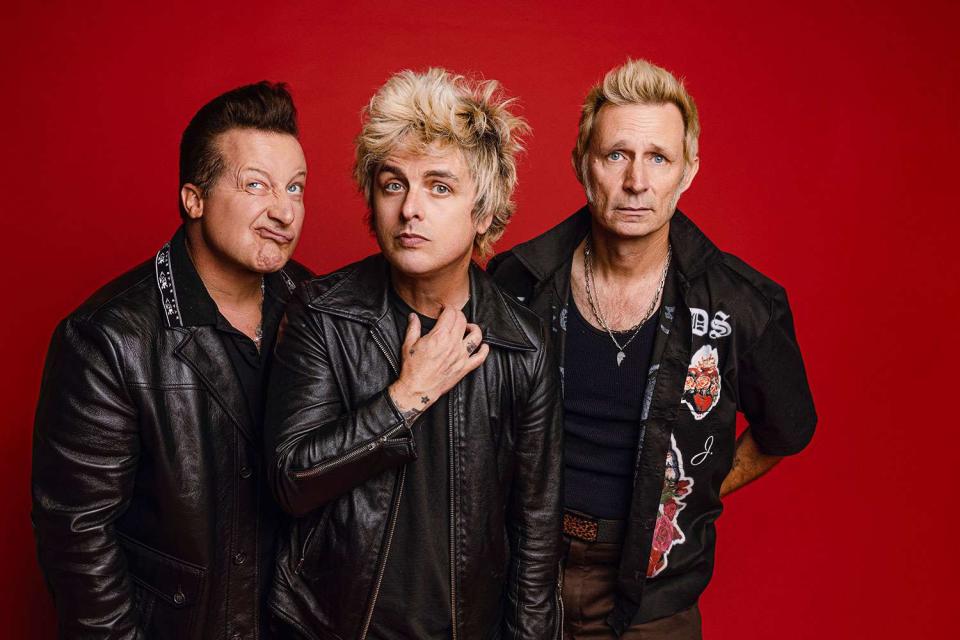Billie Joe Armstrong Breaks Down Green Day’s Biggest Hits — and Reveals Which One They Almost Gave Away (Exclusive)
- Oops!Something went wrong.Please try again later.
- Oops!Something went wrong.Please try again later.
- Oops!Something went wrong.Please try again later.
Green Day will release their 14th studio album, 'Saviors,' on Friday, Jan. 19

Alice Baxley
Tré Cool, Billie Joe Armstrong, Mike DirntGreen Day is rocking on.
The band will release their 14th studio album, Saviors, on Friday. And even after nearly 40 years onstage, frontman Billie Joe Armstrong's punk-rock ethos remains steadfast.
“I still try to maintain that kind of spirit about what we do,” the Oakland-based singer, 51, says, “which is just being independent and free to express yourself the way that you want.”
Since forming in 1986, Green Day has sold more than 75 million records worldwide, earned four Grammys and claimed a spot in the Rock & Roll Hall of Fame. The band — rounded out by bassist Mike Dirnt and drummer Tré Cool, both 51 — broke through in the '90s with playful ponderings on growing pains and has long made noise with sneering protest anthems. But Green Day’s music has always been packed with heart, soul and a powerful punch of vulnerability. Their new record is no different. Armstrong still tackles politics, but he also gets personal, writing about his struggles with mental health and substance abuse as well as his nearly 30-year marriage to his wife, Adrienne, 54.

Kevin Winter/Getty
Billie Joe Armstrong performing in February 2020Here, Armstrong — who will hit the road with Green Day in May for their Saviors World Tour — opens up to PEOPLE and looks back on some of the band’s most beloved hits.
"BASKET CASE"
That song [from 1994’s Dookie] was written about panic attacks, but it was a way of being self-deprecating, and that was the way of dealing with it. I wasn’t so sure about that song — I didn’t think it was going to be a single, so when it came out and got so big, I was really surprised. It’s become this song that has been in our set for the last 30 years.
"WHEN I COME AROUND"
I was living my life as just a pre-bachelor or something. I was carousing around a little bit, and I didn’t really have any connections. I just felt like, “Ah, whatever happens, happens. That’s life.” I wish I had a little bit more of that attitude now. I’m way more stressed-out now than I was when I wrote “When I Come Around.” But I still love the groove that it had. It was a different sort of feel, and we knew that song was going to be a special one on the album [Dookie].
"GOOD RIDDANCE (TIME OF YOUR LIFE)"
I had my first real girlfriend, and she went to Cal [University of California, Berkeley]. Me and Tré and a bunch of other guys lived at this house on Ashby Avenue, and she and her roommates lived above us. I remember going to this party one night and listening to these college kids play these acoustic songs, and I was like, “Oh wow, that’s pretty cool.” She was moving to Ecuador, and I was pretty heartbroken about it, so I wrote that song [from 1997’s Nimrod] for her. It’s a simple love song on a guitar, and it has ended up being played at graduations and bar mitzvahs; it’s at funerals and weddings. It’s wild what it turned into.
"BOULEVARD OF BROKEN DREAMS"
It’s just about loneliness. Anytime that I would be writing songs for a record, you feel like a sense of isolation. At that time, I went to New York by myself. I was staying in an apartment, and I was there for quite some time — over a couple months — and I was just trying to focus on writing [2004’s American Idiot] with no distractions. There can be all of this chaos going on around you, but ultimately you can find yourself pretty alone in the world.
"HOLIDAY"
I think there was a false narrative that was created to go into war after 9/11. It was like we were looking at our generation’s Vietnam. I wrote that about how scary it was watching cable news, watching as the tanks were rolling in to search and destroy. It was the first time I really felt a big divide in our country. That song [from American Idiot] is just anti-war.
"WAKE ME UP WHEN SEPTEMBER ENDS"
My father died in September of ’82, and I purposely, up until that point, never went there. I think really what I was doing was processing that loss that I had with this person that I never really knew. So I wrote that song [from American Idiot] for my father and about that loss and how 20 years had passed. I remember right after I wrote it, I felt this huge weight off my shoulders.
"STILL BREATHING"
There’s a band called 5 Seconds of Summer who wanted me to write a song for them. All of a sudden I was writing the lyrics, and I was like, “Oh my God, there’s no f---ing way I’m giving these guys this song.” There’s all those [lyrics] where it’s the last moment of someone’s life — it’s so intense. It’s just a song [from 2016’s Revolution Radio] about being a survivor.
For more People news, make sure to sign up for our newsletter!
Read the original article on People.

